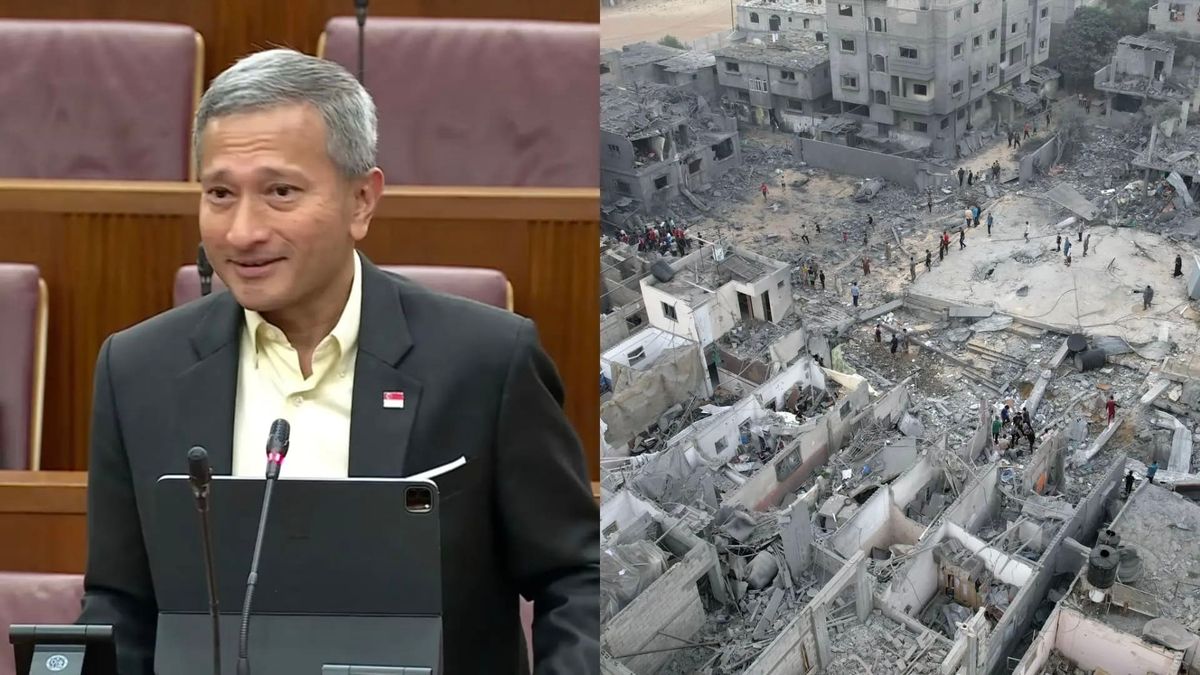Vivian Balakrishnan's speech on Israel draws mixed responses from netizens

Source: Gutzy Asia
SINGAPORE: In a parliamentary session on Thursday (29 Feb), Minister for Foreign Affairs Vivian Balakrishnan expressed concerns about Israel's military response to the 7 October Hamas attack.
Despite acknowledging that the response had "gone too far," he emphasized that severing diplomatic ties with Israel would not offer a resolution to the situation or alleviate the suffering of Palestinians.
Dr Balakrishnan addressed MPs' questions regarding the Israel-Hamas war while outlining his ministry's budget spending plans for the year.
Despite strong emotions among Singaporeans, he urged citizens not to let the conflict affect the country's harmony or cohesion, emphasizing the importance of avoiding polarization.
"Whilst we may feel a diversity of emotions on this, the worst thing would be to let this quarrel polarize and divide us as Singaporeans," he told parliament.
Last October, Hamas, a Palestinian militant group, launched a surprise attack on Israel.
They used rockets from Gaza, killing around 1,200 people and kidnapping numerous civilians.
In response, Israel heavily bombed Gaza, sent in ground troops, and this has resulted in the death and displacement of over 30,000 Palestinians, as reported by the territory's health ministry.
Dr Balakrishnan reiterated Singapore's condemnation of the attack and its recognition of Israel's right to self-defense.
While he previously called for Israel to accept a Palestinian state in November, on Thursday, Dr Balakrishnan stated that Israel's military response had crossed a critical threshold.
He emphasized the need for an immediate humanitarian ceasefire in Gaza to address the unbearable suffering of civilian victims and facilitate prompt humanitarian assistance.
Regarding calls to sever diplomatic ties with Israel, Dr Balakrishnan stressed that such a move would not be constructive and would not prompt a change in Israel's policies or an immediate reduction in Palestinian suffering.
He cited Singapore's commitment to engaging with the international community and maintaining ties with various countries for its national interests.
Singapore's position was reaffirmed at the United Nations, where it voted for two resolutions supporting the protection of civilians and upholding legal and humanitarian obligations.
Dr Balakrishnan highlighted that none of the UN Security Council's permanent members or Arab countries like Egypt and Jordan had severed ties with Israel.
The minister disclosed Singapore's plan to donate a third tranche of aid for Gaza through Jordan and expressed ongoing support for the Palestinian Authority's capacity-building efforts with a $10 million Enhanced Technical Assistance Package.
"We do all this because we look forward to the day when there's peace, and that there is a functioning, capable Palestinian state, and that the Palestinian people get the peace and progress which they so richly deserve."
Dr Balakrishnan acknowledged the deep sentiments of many Singaporeans regarding the Gaza situation but emphasized that foreign policy should not be driven by sentiment.
Foreign policy should be based on Singapore's core interests and acting consistently in accordance with the principles that safeguard its independence, sovereignty, territorial integrity and security, said Dr Balakrishnan.
In response to Leader of the Opposition Pritam Singh's question on handling foreign policy disagreements, Dr Balakrishnan emphasized the need to maintain diplomatic ties and open channels of communication.
He stressed that performative gestures like formal ties' severance might not be helpful, and keeping communication channels open allowed Singapore's positions to be heard and respected.
"We don't agree with everything that every counterpart in Israel and Arab countries state. But they listen to us. They respect our positions, they work with us to deliver assistance," Dr Balakrishnan said.
Regarding domestic policies influenced by foreign policy, Dr Balakrishnan clarified that differences with foreign counterparts were expected.
He underscored the importance of maintaining a consistent, principled base to navigate internal and external diversity.
The minister emphasized Singapore's stance on the release of hostages taken on 7 October, asserting that terrorism and hostage-taking are unequivocally wrong.
Simultaneously, Dr Balakrishnan urged Israel to acknowledge the constraints of pursuing self-defense, emphasizing the timeless wisdom that "two wrongs don't make a right."
In conclusion, he reminded everyone of our shared humanity and the universal responsibility to empathize with innocent civilians.
Following Dr Balakrishnan's speech in Parliament, a range of opinions emerged among netizens.
One commenter agreed with the minister, suggesting that maintaining friendly relations with Israel might actually benefit Palestinians.
They argued that Singapore, being a small country, lacks the influence to affect events in the conflict and severing ties could hinder any potential dialogue with Israel on behalf of the Palestinians.
Another netizen acknowledged the complexity for the Singapore government, noting the need to balance diplomatic ties with Israel, crucial for defense and financial security, while expressing concerns about the teaching of the Gaza conflict in schools.
A different perspective emphasized Singapore's position as a friend to both Israel and Palestine.
The netizen questioned what the global Muslim community wants and reminded that Singapore owes part of its self-defense capabilities to Israel, arguing against severing ties due to the influence of Hamas-controlled Gaza.
One commenter suggested exploring sanctions against Israel, similar to measures taken against Russia, to send a strong signal against their actions in the conflict.
Another accused Singapore of complicity, asserting that by strengthening ties with Israel, the nation is supporting a country engaged in what they describe as a genocide.
One netizen pointed out what they perceived as hypocrisy in Singapore's actions, referencing financial measures imposed on Russia in response to the Ukraine invasion, questioning why similar actions were not taken against Israel.
Another questioned Singapore's selective support for sovereignty, noting instances like Grenada, Ukraine, and Cambodia and asking why other conflicts were not similarly addressed.
